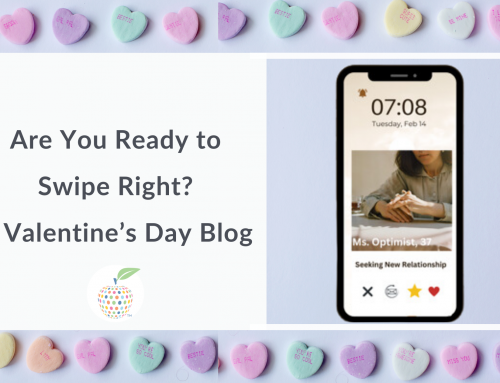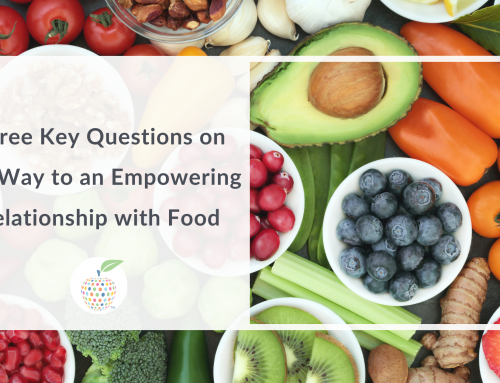A couple of months ago, I posted some thoughts on the value of finding our voice to assert our own needs to the people in our lives. Today, let’s talk about the kinds of things we might say in support of ourselves in matters dealing with eating, food, and our own bodies.
The comedian Amy Shumer once said that she took her mother to a soccer game, just so Amy could show her mother what “boundaries” are. It’s a pretty funny joke that acknowledges a truism that many of us are all-too aware of: lots of people—especially the people who seem to care about us the most—often ignore personal boundaries as they pertain to feedback on how we live our lives, especially when it comes to the things that we eat and how we look.
Not all such feedback, of course, is a problem. Sometimes we invite feedback that might be considered intrusive as a way to externalize our own accountability in pursuit of a challenging goal. We might ask a friend or loved one to “make sure I exercise this week,” or “remind me to drink enough water tomorrow;” and as long as the friendly “arm-twisting” has been invited and mutually agreed upon, this feedback arrangement works for everyone concerned. So-called meddling only becomes an issue when the feedback or advice given is unsolicited. In that case, being on the receiving end of unwanted opinions or suggestions (often shared with judgemental tones) can certainly feel like a personal violation.
Many people who violate other people’s boundaries are actually triggered by their own anxieties
People commonly violate our boundaries as an expression of their own anxieties, often projecting their own issues upon the one they are forcing their unwanted opinions upon. For instance, a parent concerned that a child’s appearance may not attract a suitable mate might nag that child about the way they look, or their weight, or their eating habits. While sometimes, to be sure, the unasked-for feedback is about real health issues, (a grandchild asking a grandparent to stop smoking would fit into this category,) much of this kind of unwelcome feedback comes from people who have bought into the prejudices and stigmas put-forth by the so-called diet culture. These ideals are based on socially-constructed beauty standards, and more often than not have little to do with actual health concerns. And ironically enough, a person who has been actively trying to gain some sort of control over their eating issues may find nagging on the subject of food triggering the very thing they are trying to manage.
People with eating disorders, or who are coping with disordered eating, often get unasked-for—and extremely unhelpful—feedback concerning many aspects of eating, food, and body issues. Unfortunately, a lot of these same people have not mastered responses to these boundary-violating, often intolerant suggestions. I am a big proponent in everyone having a voice to speak their truth and honor their own boundaries. So with that in mind, I have laid out some suggestions as to how someone might respond to unwelcome nagging without escalating the situation by responding with anger, or shutting down with resentment.
Responses to boundary-infringing advice
It is very challenging to deal with the negative comments of others if you don’t have an idea of how to respond. For someone working on overcoming eating issues, for instance, Uncle Moe’s unasked-for advice on portion size may feel like an attack, no matter Uncle Moe’s intention when he made the remark. The one feeling attacked may lash out at Uncle Moe, or feel so upset they just shut down. So having a clear idea of the words to respond with ahead of time can make these incidents manageable, and eventually Uncle Moe will (hopefully) learn not to inflict his unappreciated suggestions.
Such responses might be:
“Thank you for sharing your concern; nevertheless, it works better for me when I make my own food choices.”
“I imagine you mean well, but please do not comment on my intake.”
“Thank you for caring enough to share that with me, but please, I get to choose what I eat.”
“I hear what you’re saying, and what I eat is something that I get to decide.”
“It’s my job to manage my intake. You don’t get to go there.”
“You’re not trying to manage what I eat, are you?”
“You know, I’d prefer if we talk about something else.”
“I’ll worry about my body and you can worry about yours.”
Another tactic might be to simply change the subject:
”What do you think about that new TV show on Netflix?”
This strategy is also useful for parents who are trying to keep eating or weight anxieties away from their own children when grandma feels obligated to make comments on her grandkids’ intake. I always recommend a rule that holds that no one should talk to children about their weight or how much they eat; a person’s body (even a little person’s) is nobody’s business but their own.
A final word: It is fitting that I’m posting this right before Weight Stigma Awareness Week 2020, because while awareness is certainly important, the best way for an individual to respond to unwanted advice stigmatizing their body is to be comfortable in knowing how to shut the unwelcome suggestions, judgements and opinions down.





